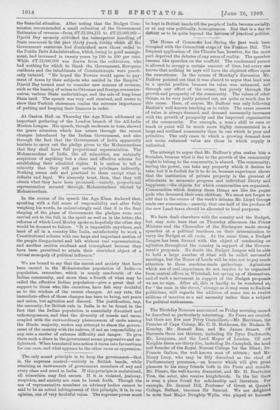We are bound to say that the unrest and anxiety
that have been caused in the Mohammedan population of India—a population, remember, which is nearly one-fourth of the Indian community, and more than a fourth of what may be called the effective Indian population—give a great deal of support to those who, like ourselves, have felt very doubtful as to the wisdom of the recent changes. At any rate, the immediate effect of those changes has been to bring, not peace and union, but agitation and discord. The justification, nay, the necessity, for British rule in India is to be found in the fact that the Indian population is essentially disunited and unhomogeneous, and that the diversity of creeds and races, coupled with the extraordinary phenomenon of caste among the Hindu majority, makes any attempt to share the govern. ment of the country with the natives, if not an impossibility, at any rate a matter of extreme difficulty and danger. To give them such a share in the government seems progressive and en- lightened. When translated into action it turns into favouritism for one race, and what appears to the other races as oppression.


























































 Previous page
Previous page